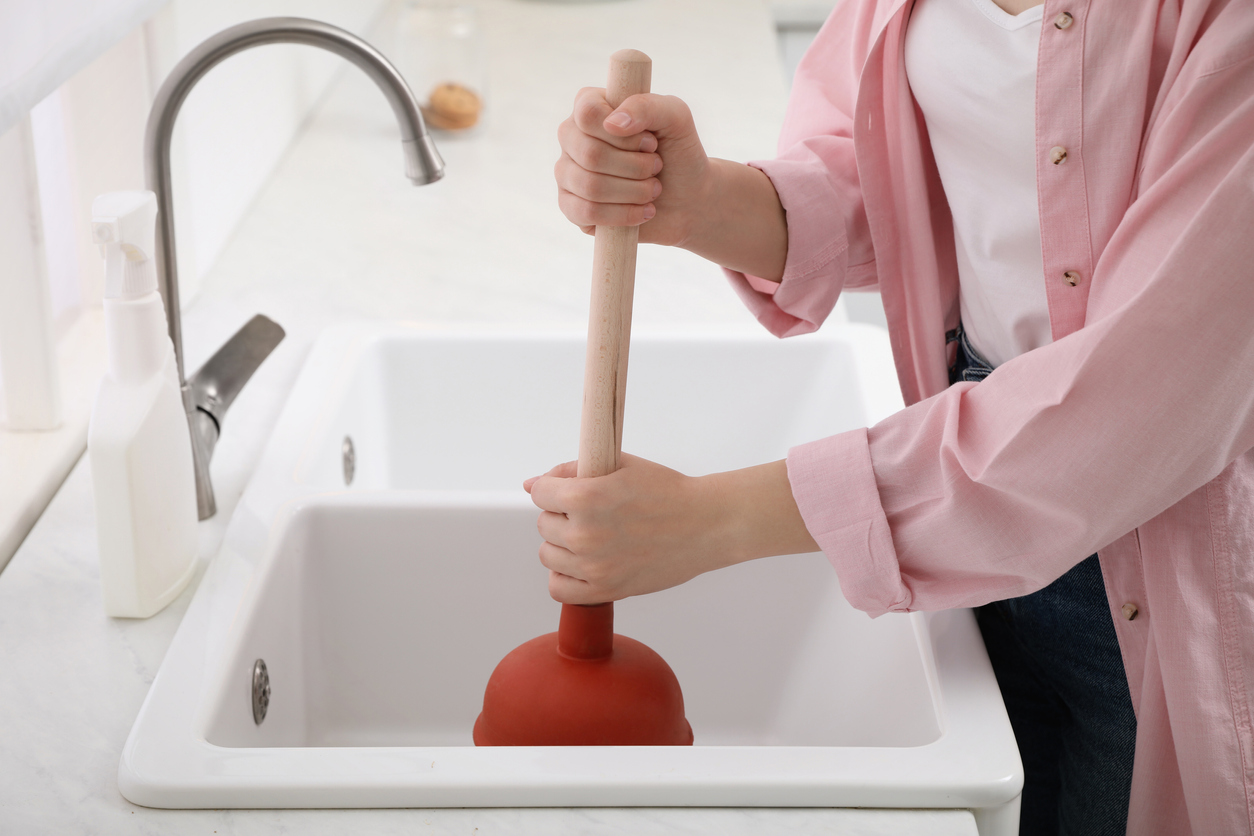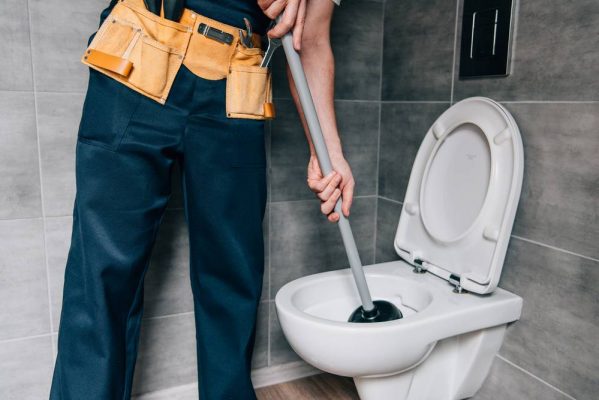How to Properly Utilize Plunger and Drain Cleaners: Expert Guide
How to Properly Utilize Plunger and Drain Cleaners: Expert Guide
Blog Article
Were you searching for facts involving How To Use Your Toilet Plunger Correctly in 5 Easy Steps?

Intro
Correct upkeep of house drains pipes is crucial for protecting against obstructions and making certain smooth water flow. One of the trick tools in every homeowner's toolkit is the bettor, together with various drainpipe cleaners made to deal with stubborn blockages effectively. This post discovers exactly how to use bettors and drain cleansers successfully to keep your drains pipes flowing easily.
Area 1: Understanding Bettors
Sorts of Plungers
There are several kinds of bettors readily available, each developed for various sorts of drains pipes and clogs. The most common types consist of mug plungers, flange plungers, and accordion bettors.
Exactly How Plungers Work
Plungers service the concept of developing stress and suction to dislodge clogs. When effectively used over a drain, they produce a vacuum cleaner that can pull out particles or separate blockages.
Selecting the Right Plunger
Choosing the right plunger relies on the sort of drain and the nature of the blockage. Mug plungers are suitable for sinks and tubs, while flange plungers are much better matched for bathrooms due to their design.
Usual Errors with Plungers
Preventing these mistakes makes certain efficient plunging: improper seal around the drainpipe, insufficient force, and unclear surrounding particles.
Section 2: Making Use Of Plungers Effectively
Prep work
Prior to diving, guarantee the bettor covers the drainpipe completely and forms a limited seal. Clear any visible particles around the drain opening.
Method
Beginning with gentle plunging activities to build suction. Boost stress progressively, using a consistent rhythm. Repeat as essential until the drain clears.
Fixing Tips
If diving does not function, attempt readjusting the seal, using oil jelly for a better seal, or using a different type of plunger.
Section 3: Understanding Drainpipe Cleaning Company
Sorts Of Drainpipe Cleaning Company
Drain cleaners can be chemical or enzymatic. Chemical cleaners utilize solid chemicals to liquify obstructions, while chemical cleaners use natural enzymes to break down organic matter.
How Drain Cleaners Work
Chemical cleaners react with blockages to dissolve them, while chemical cleaners break down natural materials like hair and grease without hurting pipes.
Safety and security Considerations
Constantly use handwear covers and eye security when using chemical drain cleansers. Guarantee adequate ventilation and follow manufacturer directions very carefully.
Eco-Friendly Alternatives
Consider making use of vinegar and cooking soft drink or enzyme-based cleansers for eco-friendly options that are safer for pipes and the setting.
Area 4: Making Use Of Drainpipe Cleansers Efficiently
Application Techniques
Pour chemical cleansers directly into the drainpipe opening. Permit them to help the recommended time prior to purging with hot water. Chemical cleaners should rest overnight.
Precautions
Avoid blending different types of cleansers, as this can create toxic fumes. Never ever use chemical cleansers along with a bettor, as splashing can take place.
Managing Persistent Blockages
For relentless blockages, take into consideration using a pipes serpent or calling a specialist plumber to avoid damages to pipelines.
Verdict
In conclusion, understanding exactly how to make use of bettors and drain cleaners properly is vital for keeping healthy and balanced plumbing systems. By choosing the right tools and methods, home owners can tackle small obstructions and stop significant plumbing issues down the line.
How To Properly Use A Plumbing Snake To Clear Drains
When any drain clogs in our home arise, we tend to gravitate toward the plunger and little else. In cases where the plunger and its vacuum-created pressure are not able to clear clogs, many immediately move to harmful chemicals or simply call their plumber to fix the issue.
we’re happy to help with all drain cleaning needs and concerns. This includes informing you on a few other home remedies you may have at your disposal for minor to moderate clogs, one of which is the use of a plumbing snake. Many people have never used one of these before – let’s go over the steps to take when your drain clogs and you have a plumbing snake available.
Attempt Plunger Use
The first step here, as we noted above, should indeed be to grab your plunger when you notice a drain clog and attempt to resolve it this way. If you’re unsure how to use a particular type of plunger, our plumbers can answer any questions you have. If this doesn’t do the trick, however, you move on to the snake.
Locate And Prepare Snake
A plumbing snake is a metal or plastic device that’s generally about a quarter of an inch thick. It’s design with significant extensions, meant to reach down into your clogged drain and push the clog out. Snakes also contain drain augers that will latch onto and push stubborn blockages.
If your plunger doesn’t clear a clog, locate your snake and bring it to the drain in question. We also recommend keeping a bucket nearby to collect the clog once you pull it out, plus we’d advise wearing goggles and possibly protective gloves.
Feed Snake
Once you’re ready to go, feed the snake slowly down the drain, using the crank device it comes with to keep it moving until it finds the clog. Once this happens, much of the clog will be latched onto the coil so you can pull it out, while the rest will simply break up and flow downward.
Detach Debris
Remove the snake slowly from the drain, and once you’ve done so, pick off any debris that’s stuck to the coil. This is another area where wearing gloves is a must.
Flush Drain
Finally, take a few minutes to ensure the snake has done its job correctly. If you’ve been using it on a toilet, flush the toilet a couple times and make sure everything flows well. If you’ve used it on a different drain, flush it with some room temperature water.
https://www.mybuddytheplumber.com/blog/how-to-properly-use-a-plumbing-snake-to-clear-drains/

Application Techniques
Pour chemical cleansers directly into the drainpipe opening. Permit them to help the recommended time prior to purging with hot water. Chemical cleaners should rest overnight.
Precautions
Avoid blending different types of cleansers, as this can create toxic fumes. Never ever use chemical cleansers along with a bettor, as splashing can take place.
Managing Persistent Blockages
For relentless blockages, take into consideration using a pipes serpent or calling a specialist plumber to avoid damages to pipelines.
Verdict
In conclusion, understanding exactly how to make use of bettors and drain cleaners properly is vital for keeping healthy and balanced plumbing systems. By choosing the right tools and methods, home owners can tackle small obstructions and stop significant plumbing issues down the line.
How To Properly Use A Plumbing Snake To Clear Drains
When any drain clogs in our home arise, we tend to gravitate toward the plunger and little else. In cases where the plunger and its vacuum-created pressure are not able to clear clogs, many immediately move to harmful chemicals or simply call their plumber to fix the issue.
we’re happy to help with all drain cleaning needs and concerns. This includes informing you on a few other home remedies you may have at your disposal for minor to moderate clogs, one of which is the use of a plumbing snake. Many people have never used one of these before – let’s go over the steps to take when your drain clogs and you have a plumbing snake available.
Attempt Plunger Use
The first step here, as we noted above, should indeed be to grab your plunger when you notice a drain clog and attempt to resolve it this way. If you’re unsure how to use a particular type of plunger, our plumbers can answer any questions you have. If this doesn’t do the trick, however, you move on to the snake.
Locate And Prepare Snake
A plumbing snake is a metal or plastic device that’s generally about a quarter of an inch thick. It’s design with significant extensions, meant to reach down into your clogged drain and push the clog out. Snakes also contain drain augers that will latch onto and push stubborn blockages.
If your plunger doesn’t clear a clog, locate your snake and bring it to the drain in question. We also recommend keeping a bucket nearby to collect the clog once you pull it out, plus we’d advise wearing goggles and possibly protective gloves.
Feed Snake
Once you’re ready to go, feed the snake slowly down the drain, using the crank device it comes with to keep it moving until it finds the clog. Once this happens, much of the clog will be latched onto the coil so you can pull it out, while the rest will simply break up and flow downward.
Detach Debris
Remove the snake slowly from the drain, and once you’ve done so, pick off any debris that’s stuck to the coil. This is another area where wearing gloves is a must.
Flush Drain
Finally, take a few minutes to ensure the snake has done its job correctly. If you’ve been using it on a toilet, flush the toilet a couple times and make sure everything flows well. If you’ve used it on a different drain, flush it with some room temperature water.
https://www.mybuddytheplumber.com/blog/how-to-properly-use-a-plumbing-snake-to-clear-drains/

Do you appreciate reading about Tips on How to Effectively Use a Plunger? Give a review directly below. We will be pleased to know your reactions about this page. We hope to see you back again in the future. Appreciated our content? Please share it. Let others discover it. We appreciate your readership.
Call Us Today Report this page